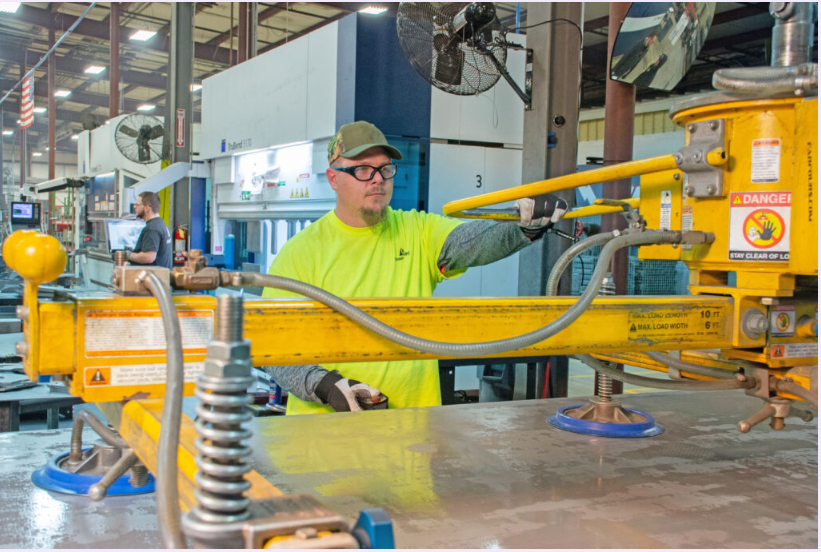
Outline for “Production Operator Job in Italy”
- H1: Introduction to Production Operator Jobs in Italy
- Overview of the Italian Job Market
- Importance of Manufacturing in Italy
- H2: What is a Production Operator?
- H3: Definition and Role in Manufacturing
- H3: Key Responsibilities of a Production Operator
- H2: Skills Required for a Production Operator
- H3: Technical Skills
- H3: Soft Skills
- H2: Education and Certification Requirements
- H3: Academic Qualifications
- H3: Certification Programs
- H2: Industries Hiring Production Operators in Italy
- H3: Automotive Industry
- H3: Food and Beverage Industry
- H3: Textile and Fashion Industry
- H2: Typical Work Environment for Production Operators
- H3: Work Conditions
- H3: Tools and Equipment Used
- H2: Salary Expectations for Production Operators in Italy
- H3: Average Salary
- H3: Factors Influencing Pay
- H2: Benefits of Being a Production Operator in Italy
- H3: Job Security
- H3: Career Growth Opportunities
- H2: Challenges Faced by Production Operators
- H3: Physical Demands
- H3: Work-Life Balance
- H2: How to Find a Production Operator Job in Italy
- H3: Job Portals and Websites
- H3: Networking and Recruitment Agencies
- H2: Tips for Succeeding as a Production Operator
- H3: Continuous Learning
- H3: Attention to Detail
- H2: Growth Opportunities in Production Operations
- H3: Promotion Paths
- H3: Transitioning to Other Roles
- H2: Importance of Language Skills for Production Operators
- H3: Knowing Italian vs. English
- H3: Communication on the Production Floor
- H2: The Future of Production Operator Jobs in Italy
- H3: Impact of Technology and Automation
- H3: Job Outlook and Opportunities
- H1: Conclusion
- FAQs
- H3: What qualifications do I need to become a Production Operator in Italy?
- H3: How much does a Production Operator earn in Italy?
- H3: Are there growth opportunities for Production Operators?
- H3: Do I need to speak Italian to work as a Production Operator in Italy?
- H3: What are the working conditions like for Production Operators?
Production Operator Job in Italy
Introduction to Production Operator Jobs in Italy
Production Operator Job In Italy. taly, famous for its rich history, culture, and delectable cuisine, is also a strong player in the global manufacturing industry. From luxury cars to high-end fashion, Italian products are renowned worldwide. Within this diverse and dynamic manufacturing landscape, the role of a Production Operator is crucial. Whether it’s assembling cars in Turin or processing food in Parma, production operators ensure that everything runs smoothly. But what exactly does a production operator do, and how can you become one in Italy? Let’s explore.
Title: Production Operator Job
Post: Multiple
Salary: Handsome salary
Experience: 1 year
What is a Production Operator?
Definition and Role in Manufacturing
A production operator is an individual responsible for operating machinery, overseeing production processes, and ensuring that products are manufactured efficiently and meet quality standards. In Italy’s manufacturing sector, these operators play a vital role in keeping production lines moving, whether it’s in the automotive, food, or fashion industries.
Key Responsibilities of a Production Operator
- Operating machinery and production equipment
- Monitoring production processes
- Performing quality checks on products
- Following safety and health protocols
- Reporting any equipment malfunctions or production issues
- Maintaining a clean and organized workspace
Skills Required for a Production Operator
Technical Skills
As a production operator, you need to be proficient with machinery and equipment. Familiarity with automated systems, basic mechanical skills, and an understanding of the production process are essential. Being detail-oriented and able to troubleshoot minor issues are also critical skills in this role.
Soft Skills
In addition to technical abilities, soft skills such as teamwork, communication, and time management are important. Production operators often work in teams, so being able to communicate effectively and work harmoniously with colleagues is key to success.
Education and Certification Requirements
Academic Qualifications
Most production operator positions require at least a high school diploma or an equivalent qualification. Some companies may prefer candidates with a vocational degree or diploma in manufacturing or mechanical engineering.
Certification Programs
While not always mandatory, obtaining certifications in machine operation, safety protocols, or specific production systems can give candidates a competitive edge. Courses in lean manufacturing, quality assurance, and machinery maintenance are particularly valued.
Industries Hiring Production Operators in Italy
Automotive Industry
Italy’s automotive sector, led by brands like Fiat and Ferrari, is a major employer of production operators. The industry demands precision and efficiency in assembling vehicles, making skilled operators indispensable.
Food and Beverage Industry
From pasta to wine, Italy is a powerhouse in food and beverage production. Operators in this sector ensure that production lines run efficiently, adhering to strict hygiene and quality standards.
Textile and Fashion Industry
Italy’s reputation in fashion and textiles is unmatched. Production operators in this industry work on high-end clothing, footwear, and accessories, ensuring that every stitch and cut is perfect.
Typical Work Environment for Production Operators
Work Conditions
Production operators typically work in industrial settings such as factories and manufacturing plants. These environments can be noisy and require long periods of standing or repetitive motion.
Tools and Equipment Used
Operators use a variety of tools, ranging from simple hand tools to complex machinery. They must be familiar with operating equipment like conveyor belts, robotic arms, and assembly machines.
Salary Expectations for Production Operators in Italy
Average Salary
The average salary for a production operator in Italy ranges from €20,000 to €30,000 per year, depending on the industry, experience, and location. Some industries, like automotive and high-tech manufacturing, tend to offer higher wages.
Factors Influencing Pay
Factors such as level of experience, certifications, and geographical location can significantly influence pay. Operators working in northern industrial hubs like Milan or Turin may earn more than those in other regions.
Benefits of Being a Production Operator in Italy
Job Security
Manufacturing is a cornerstone of the Italian economy, offering stability and job security to production operators. Companies often invest in their workforce, providing training and development opportunities.
Career Growth Opportunities
Production operators can advance in their careers by acquiring additional skills or certifications. Promotions to supervisory roles or specialized positions are common pathways for growth.
Challenges Faced by Production Operators
Physical Demands
The job can be physically demanding, requiring long hours of standing, lifting, and repetitive motions. This can lead to fatigue or strain if proper precautions aren’t taken.
Work-Life Balance
Shift work is common in manufacturing, which can sometimes disrupt personal schedules. Balancing work with family or leisure time can be challenging for operators working irregular hours.
How to Find a Production Operator Job in Italy
Job Portals and Websites
Job search engines like Indeed, Glassdoor, and local Italian job portals such as InfoJobs and Trovolavoro are great places to start your search. Many companies post openings on their official websites as well.
Networking and Recruitment Agencies
Networking with industry professionals and reaching out to recruitment agencies can also help in landing a job. Recruitment agencies often have access to positions that are not advertised publicly.
Tips for Succeeding as a Production Operator
Continuous Learning
Stay up-to-date with new technologies and machinery by taking additional courses or training programs. The more skilled you are, the more valuable you become to employers.
Attention to Detail
Paying close attention to detail is crucial in production work. A small mistake can lead to defects or downtime, so being meticulous can set you apart from other operators.
Growth Opportunities in Production Operations
Promotion Paths
With experience and further education, production operators can be promoted to roles such as production supervisors or managers. These positions involve overseeing the entire production process and managing teams.
Transitioning to Other Roles
Production operators can transition into other areas of manufacturing, such as quality assurance, maintenance, or logistics, offering a diverse career path within the industry.
Importance of Language Skills for Production Operators
Knowing Italian vs. English
While many international companies operate in Italy, knowing Italian is often essential for communication on the production floor. However, English can be beneficial, especially in companies with a global presence.
Communication on the Production Floor
Clear communication is key to ensuring safety and efficiency. Language barriers can cause misunderstandings, so proficiency in the local language is important for success.
The Future of Production Operator Jobs in Italy
Impact of Technology and Automation
Automation and advancements in technology are changing the landscape of production jobs. While some traditional roles may be reduced, there will still be a need for skilled operators who can work alongside new technology.
Job Outlook and Opportunities
Despite the rise of automation, the demand for production operators is expected to remain steady in the coming years. New opportunities may arise in industries that adopt advanced manufacturing technologies.
**Conclusion
**
Becoming a production operator in Italy can be a rewarding career path, offering job security and opportunities for growth. With the right skills and mindset, you can succeed in this dynamic and essential role within the Italian manufacturing sector.
FAQs
What qualifications do I need to become a Production Operator in Italy?
Typically, a high school diploma or equivalent is required, along with vocational training or certifications depending on the industry.
How much does a Production Operator earn in Italy?
The average salary ranges from €20,000 to €30,000 per year, with variations based on experience, industry, and location.
Are there growth opportunities for Production Operators?
Yes, production operators can advance to supervisory roles or transition into specialized positions within the manufacturing industry.
Do I need to speak Italian to work as a Production Operator in Italy?
While some international companies may use English, knowing Italian is often essential for communication on the production floor.
What are the working conditions like for Production Operators?
Production operators typically work in factories, which can be noisy and involve long hours of standing or repetitive tasks. However, these jobs also offer job security and opportunities for advancement.
I hope you are having a wonderful day! I have a small favor to ask. I’m aiming to rank in the top 10 on the ChatGPT store, and I can’t do it without your amazing support. Could you please use my GPT [https://bit.ly/GPT_Store] and leave some feedback? Your positive reviews would mean the world to me and help me achieve my goal. Additionally, please bookmark my GPT for easy access in the future.
Thank you so much for your kindness and support!
Warm regards





